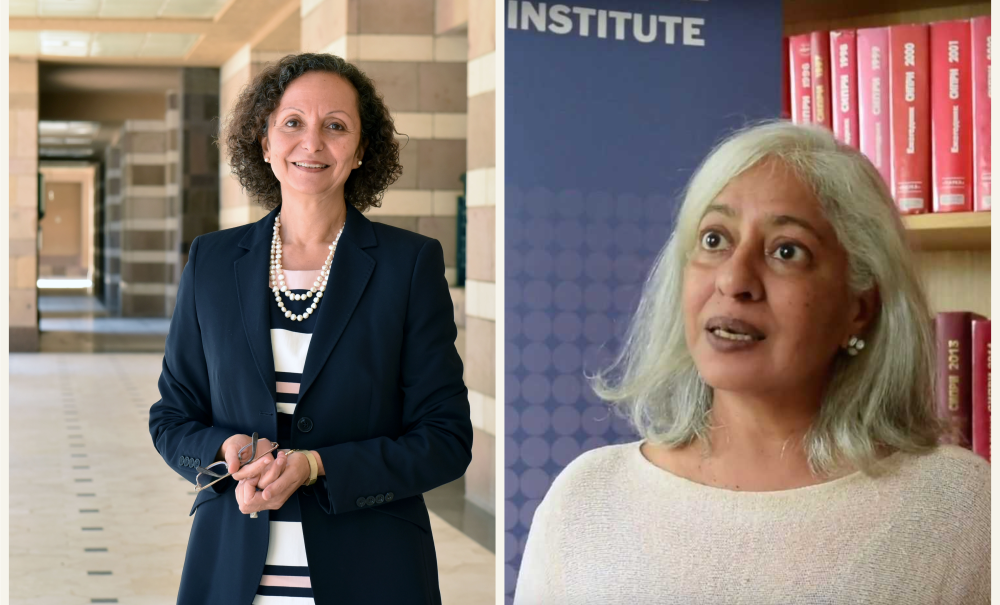
Dean Noha El-Mikawy chats with Radha Kumar
Radha Kumar is a specialist in ethnic conflicts, peacemaking, and peacebuilding and has written five books and numerous journal articles on the topic and holds a PhD from Jawaharlal Nehru University, India, and an MA and BA from Cambridge University, UK. Kumar is Former Chair of the United Nations University Council and Former Director General of the Delhi Policy Group, the first independent think tank in India. Kumar has been on several governing boards including the UN Institute for Training and Research (UNITAR), the Foundation for Communal Harmony (India, Ministry of Home Affairs), and the Swedish International Peace Research Institute.
Question 1: Considered the biggest elections in the world in terms of the number of eligible voters, how was the turnout in relative perspective? And what does it say about India in a world increasingly seeing right-wing parties claiming electoral victory?
Answer: Overall, the turnout was a little less than in earlier elections at around 66 percent, but fell to below 60 percent in six states, four of which were BJP-headed or controlled – Bihar, Delhi, Uttar Pradesh and Uttarakhand. Even so, the turnout was higher than in many other democracies, partly because the vote is the only opportunity the poor have to assert their priorities in a highly unequal society like India’s. One trend worth noting is that women voters’ turnout, which used to be far less than men’s, started closing the gap from 2009 and is now equal to the latter.
The BJP started out in this election with the claim that it would vastly increase its majority. Instead, it fell below the majority mark. The result is undoubtedly is a partial victory for Indian democrats and a “No” to Mr. Modi’s personality cult and the BJP’s political Hindutva that valorised building a Ram temple over livelihood and civil rights.
Question 2: PM Modi’s party claimed victory but lost its majority. What does it mean, who were the biggest winners and losers, and what was these elections’ biggest surprise?
Answer: Despite the BJP’s loss, the BJP-led National Democratic Alliance won the majority. Mr. Modi will head the coming administration, but is dependent on his coalition partners, the Telegu Desam Party and Janata Dal United, which are the kingmakers on whom the coalition rests or falls. Overall, the biggest winner is the Opposition INDIA (Indian National Development and Inclusivity Alliance), which performed hugely above expectations, despite facing a highly unequal playing field in which its members were arrested and/or had their bank accounts frozen. They now constitute a powerful Opposition that will constrain, for example, the BJP’s polarization of the polity.
The biggest surprise of this election is the BJP’s startling defeat in the largest and Hindi heartland state of Uttar Pradesh, where it was beaten by the regional Samajwadi Party and the Congress. Its simultaneous defeat in Maharashtra, one of India’s most economically powerful states, suggests that India might be on the cusp of a new wave of democracy renewal, but we will have to wait and watch.
Question 3: How will that affect India’s leadership in Asia, in BRICS, and the global south in general?
Answer: Overall, I expect only slight changes at the formal level. Tensions with Pakistan and China will continue, and relations with other neighbors will remain reasonably tension-free. The Modi administration has been muted in Asia when compared to its predecessor Manmohan Singh administration that strengthened policy convergence and connectivity with East Asia and signed a large number of strategic partnerships with Arab countries (called West Asia in India). India’s role in BRICS and the global south has shrunk too, with China taking an increasingly upper hand, in comparison to the Manmohan Singh administration.
Where I see potential for growth is at the informal level. A much broader-based engagement will now be possible between parliamentarians and civil society, including liberal arts educators. This will permit interested Asian or global south leaders to anchor their relations with India far more firmly than the current largely official engagement allows.